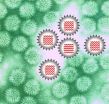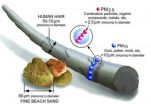(Press-News.org) A combination of genetic predisposition and environmental factors is believed to cause autoimmune (type 1) diabetes. A study published on March 27th in PLOS Pathogens gets at the mechanisms by which rotavirus infection contributes to autoimmune diabetes in a mouse model of the disease.
NOD (for non-obese diabetic) mice are prone to develop diabetes, and infection with rotavirus accelerates onset of the disease. Barbara Coulson and colleagues, from The University of Melbourne, Australia, tested the hypothesis that the virus does this by inducing "bystander activation".
Bystander activation assumes that a foreign intruder (in this case rotavirus) provokes a strong but non-specific activation of the immune system, and that this heightened state of activation "spills over" to a subset of specific immune cells that can recognize and attack not the viral intruder but some of the body's own cells, in this case the insulin-producing islet cells in the pancreas.
Indeed, the researchers found that when spleen cells from NOD mice encounter rotavirus, they activate two types of immune cells: antibody-producing B cells and so-called dendritic cells that are a key part of a coordinated immune response. They could show that this activation involves "unpacking" of the virus (thereby exposing its viral immune activators), as well as specific immune mediators of the host, including one called TLR7 and type 1 interferons.
Rotavirus activation of a specific dendritic cell type called plasmacytoid dendritic cells was necessary for activation of another type of immune cells called T cells. These T cells can recognize and destroy islet cells and are ultimately responsible for type 1 diabetes. When activated, plasmacytoid dendritic cells produce very high levels of type 1 interferons, suggesting it has a specific role in mediating the bystander effect that connects rotavirus infection to accelerated diabetes.
Taken together, the results suggest that viral infection is capable of accelerating type 1 diabetes through an immune bystander effect and points to a number of key players--immune cells and immune modulators like interferon--that are linked to disease acceleration in the mouse model and worth investigating in humans. The authors conclude that, in particular, "the role of type 1 interferon signaling in diabetes acceleration following rotavirus infection deserves further analysis."
INFORMATION:
In your coverage please provide this link to the freely available paper:
http://dx.plos.org/10.1371/journal.ppat.1003998 (link goes live upon article publication)
Contact: Barbara Coulson
e-mail: barbarac@unimelb.edu.au
Authors and Affiliations:
Jessica A. Pane, Nicole L. Webster, Barbara S. Coulson at the The University of Melbourne, Australia
Funding: This work was supported by Project Grants (509008 and 1044868) and a Senior Research Fellowship (628319) to BSC from the National Health and Medical Research Council of Australia (http://www.nhmrc.gov.au). The funders had no role in study design, data collection and analysis, decision to publish, or preparation of the manuscript.
Competing Interests: Pane JA, Webster NL, Coulson BS (2014) Rotavirus Activates Lymphocytes from Non-Obese Diabetic Mice by Triggering Toll-Like Receptor 7 Signaling and Interferon Production in Plasmacytoid Dendritic Cells. PLoS Pathog 10(3): e1003998. doi:10.1371/journal.ppat.1003998
Citation: The authors have declared that no competing interests exist.
How rotavirus infection accelerates autoimmune diabetes in a mouse model
2014-03-27
ELSE PRESS RELEASES FROM THIS DATE:
Genetic variation linked to heart disease risk through RNA machinery
2014-03-27
Researchers have pinpointed a new mechanism of how natural variation in our DNA alters an individual's risk for developing heart disease by interfering with the ability of a developmental gene to interact with a specialized type of RNA. This work expands on previous work identifying the "hidden" causes of complex disease risk, with the goal of unlocking new pathways and potential drug targets for cardiovascular disease.
This latest study led by Thomas Quertermous, MD at Stanford University and Georg Sczakiel, PhD at the University of Lübeck (Germany) was a joint effort ...
Ancient African cattle first domesticated in Middle East
2014-03-27
Geneticists and anthropologists previously suspected that ancient Africans domesticated cattle native to the African continent nearly 10,000 years ago. Now, a team of University of Missouri researchers has completed the genetic history of 134 cattle breeds from around the world. In the process of completing this history, they found that ancient domesticated African cattle originated in the "Fertile Crescent," a region that covered modern day Iraq, Jordan, Syria and Israel.
In their study published in PLOS Genetics, Prof. Decker (University of Missouri) and a team of international ...
Autoimmune drug may help prevent kidney disease caused by diabetes
2014-03-27
Washington, DC (March 27, 2014) — A drug currently used to treat autoimmune disease may also help prevent the kidney-damaging effects of diabetes, according to a study appearing in an upcoming issue of the Journal of the American Society of Nephrology (JASN). The findings suggest that clinical trials should be designed to test the drug in diabetic patients.
Kidney disease is one of the most serious complications of diabetes. Diabetics who develop kidney disease, or diabetic nephropathy, due to high blood glucose levels may eventually require dialysis or a kidney transplant. ...
Major depression linked with nearly twice the risk of kidney failure in diabetics
2014-03-27
Washington, DC (March 27, 2014) — Major depression may increase diabetes patients' risk of developing kidney failure, according to a study appearing in an upcoming issue of the Clinical Journal of the American Society of Nephrology (CJASN). Additional studies are needed to determine whether treatment for depression can improve kidney health in patients with diabetes.
Individuals with diabetes have a high prevalence of depressive symptoms, which has previously been linked with negative health outcomes such as cardiovascular disease and premature death. Little is known ...
Gulf War illness not in veterans' heads, but in their mitochondria
2014-03-27
Researchers at the UC San Diego School of Medicine have demonstrated for the first time that veterans of the 1990-91 Persian Gulf War who suffer from "Gulf War illness" have impaired function of mitochondria – the energy powerhouses of cells.
The findings, published in the March 27, 2014 issue of PLOS ONE, could help lead to new treatments benefitting affected individuals – and to new ways of protecting servicepersons (and civilians) from similar problems in the future, said principal investigator Beatrice A. Golomb MD, PhD, professor of medicine.
Golomb, with associate ...
Stroke patients should receive customized palliative care
2014-03-27
People recovering from a stroke should have a well-coordinated medical team to personalize care, optimize quality of life and minimize suffering, according to a scientific statement published in the American Heart Association journal Stroke.
The statement is the first in the United States to outline fundamental palliative care for stroke survivors. Palliative care is patient- and family-centered care that improves life by anticipating, preventing and treating suffering.
"The majority of stroke patients need access to some form of palliative medicine," said Robert Holloway, ...
Consistent blood pressure control may cut rate of second stroke in half
2014-03-27
Stroke survivors who consistently control their blood pressure may reduce the likelihood of a second stroke by more than half, according to new research in the American Heart Association journal Stroke.
For the study, researchers analyzed the results from the Vitamin Intervention for Stroke Prevention (VISP) trial, which enrolled 3,680 ischemic stroke patients ages 35 and older in 1996-2003. Ischemic strokes are caused by a clot or other blockage in a blood vessel supplying the brain. Participants had been tested for several risk factors, including blood pressure levels ...
US clean-air efforts stay on target
2014-03-27
HOUSTON – (March 27, 2014) – National efforts in the last decade to clear the air of dangerous particulate matter have been so successful that most urban areas have already attained the next benchmark, according to new research by Rice University.
Atmospheric researchers at Rice studied the state implementation plans (SIPs) from 23 regions mandated by the Environmental Protection Agency to reduce particulate matter (PM) smaller than 2.5 microns (PM 2.5) to less than 15 micrograms per cubic meter by 2009.
The Rice analysis appears this week in the Journal of the Air ...
Mechanical forces driving breast cancer lead to key molecular discovery
2014-03-27
The stiffening of breast tissue in breast-cancer development points to a new way to distinguish a type of breast cancer with a poor prognosis from a related, but often less deadly type, UC San Francisco researchers have found in a new study.
The findings, published online March 16, 2014 in Nature Medicine, may lead eventually to new treatment focused not only on molecular targets within cancerous cells, but also on mechanical properties of surrounding tissue, the researchers said.
In a mouse model of breast cancer, scientists led by Valerie Weaver, PhD, professor of ...
Notre Dame scientists develop largest developmental proteomic data set for any animal
2014-03-27
Now that the human genome is sequenced, University of Notre Dame researchers are focusing on the study of the proteome, which is the protein content of an organism, tissue or cell. Bioanalytical chemist Norman Dovichi and molecular biologist Paul Huber have successfully tracked the changing patterns of protein expression during early development of Xenopus laevis, or African clawed frog, embryos. They have developed the largest data set on developmental proteomics for any organism, and have included the single-cell zygote.
Their research has uncovered an unexpected amount ...

